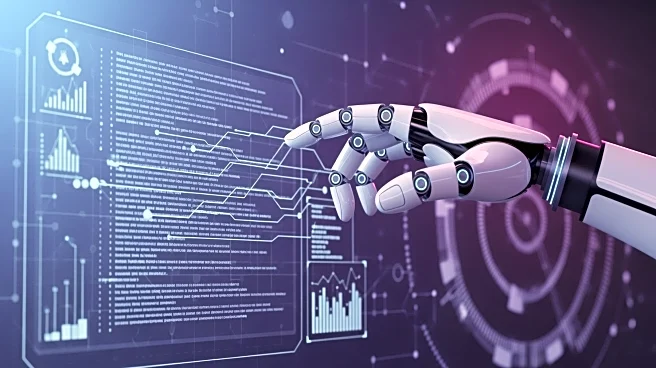What's Happening?
Anthropic CEO Dario Amodei has announced that artificial intelligence models are responsible for generating approximately 90% of the code used within the company. This revelation was made during the Dreamforce
conference in San Francisco, where Amodei confirmed his earlier prediction that AI would handle most coding tasks within six months. Despite the significant role AI now plays in coding, Amodei emphasized that human engineers are still crucial, suggesting that the need for software engineers might even increase. This shift allows engineers to focus on more complex programming challenges while overseeing AI systems. The trend is not isolated to Anthropic; Y Combinator CEO Garry Tan noted that a quarter of startups in their program use AI to write 95% or more of their code. However, this transformation is affecting employment patterns, with a study indicating a 20% decline in developer positions for those aged 22-25 since the launch of ChatGPT, while demand for experienced engineers remains strong.
Why It's Important?
The increasing reliance on AI for coding tasks represents a significant shift in the software engineering industry. This development could lead to changes in employment dynamics, particularly affecting younger developers who may find fewer entry-level positions available. However, experienced engineers are still in demand, suggesting a potential rebalancing of the workforce where AI handles routine tasks, allowing human engineers to focus on more complex issues. This shift could enhance productivity and innovation within tech companies, as engineers are freed from mundane coding tasks. Additionally, the widespread adoption of AI in coding could accelerate the development of new technologies and applications, impacting various sectors reliant on software solutions.
What's Next?
As AI continues to take on more coding responsibilities, companies may need to adapt their hiring practices and training programs to accommodate this new landscape. There could be an increased focus on reskilling and upskilling existing employees to ensure they can effectively collaborate with AI systems. Furthermore, the industry might see a rise in demand for engineers with expertise in AI oversight and integration. Stakeholders, including educational institutions and tech companies, may need to address the potential impact on job availability for new graduates and consider strategies to support their entry into the workforce.
Beyond the Headlines
The ethical implications of AI taking over coding tasks are worth considering, particularly in terms of job displacement and the potential for bias in AI-generated code. Companies will need to ensure that AI systems are transparent and accountable, maintaining high standards of quality and fairness. Additionally, the cultural shift towards AI-driven coding could influence the way software is developed, with a greater emphasis on collaboration between humans and machines. Long-term, this could lead to a redefinition of the role of software engineers, focusing more on strategic oversight and innovation rather than routine coding tasks.










